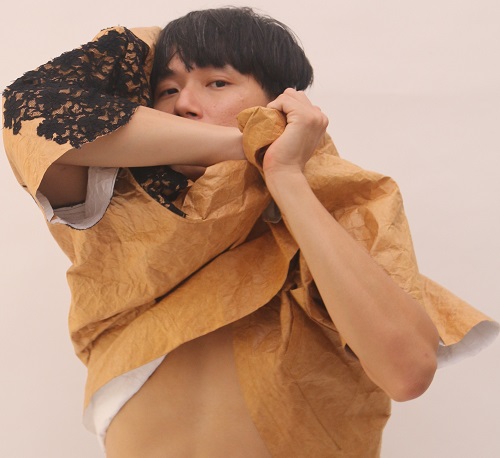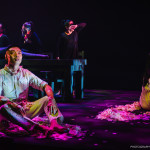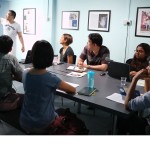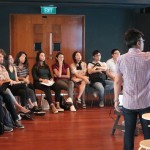2017 is turning out to be a year of goodbyes, as a number of practitioners from the theatre and dance community are going overseas to pursue further studies. We’re delighted that they have the chance to chase their dreams and further develop their craft, of course, but they will definitely be missed.
As quite a few of them have worked with Centre 42 in different capacities over the years, we decided to catch up with them for one last interview before they begin the next chapter of their lives. They are aspiring playwright Nur Sabrina Binte Dzulkifli, arts journalist and playwright Nabilah Said, and dance artist Lee Mun Wai.
Sabrina was part of several projects at our blue house – she was the dramaturg for Alessandra Fel’s Under My Skin and CharChey’s For the Record, and the co-writer for Pink Gajah Theatre’s Bi(cara), which were all developed under our Basement Workshop programme. She is also a member of the Malay playwright collective Main Tulis Group, which was founded by Nabilah in 2016. Both Sabrina and Nabilah presented short plays at Late-Night Texting this year under the programme “ETA: 9 MIN”. Additionally, Nabilah is also one of our Boiler Room 2015 playwrights, and her play Angkat had its first test read in September. Mun Wai, on the other hand, created a work under our Vault programme titled Dancing the Good, the Bad and the Ugly, where he examined the social themes in Elangovan’s plays from the 2000s.
We wish Sabrina, Nabilah, and Mun Wai all the best, and look forward to hearing all about their adventures abroad when they come back!
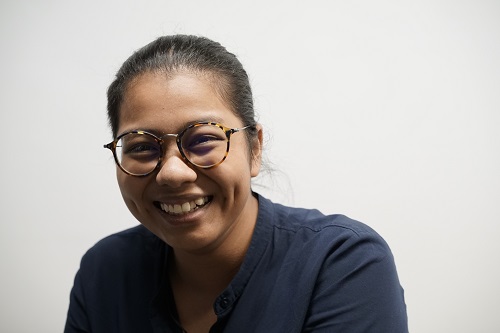
Nur Sabrina Binte Dzulkifli. Photo: Andre Chong.
What was the experience of working on the various projects at Centre 42 like for you?
Sabrina: Each of the projects I did at Centre 42 came with their unique bundle of challenges and working methods, but every single one of them was a valuable learning experience that I was happy to have. For me, Centre 42 has kind of always been home. A large chunk of the projects that I can put on my artist portfolio has been with you guys – whether as part of one of your Basement Workshop projects or just hosting us for rehearsal and meeting space. In that sense, I feel like the projects that have been hosted at Centre 42 have always had the full support of the team behind Centre 42.
Nabilah: Stressful but fun (laughs). I joined Boiler Room at a time when I was very unsure of myself as a playwright. I think I needed some form of validation that I was doing something right. This is random, but when I was being interviewed for the Boiler Room programme in 2015, I was in Inner Mongolia on a work trip and I had just returned from the desert. Casey Lim, Dr Robin Loon and Nelson Chia were the ones interviewing me [over Skype] and they were like, “where’s the desert?” because by then, I was already back in a hotel room. But maybe it was a metaphorical desert that I was in at that time – I was alone in my writing journey, shuffling in the sand.
That led me to forming Main Tulis Group (MTG). I approached Dr Loon and Casey about this idea back in 2016 – I pitched it to them over thosai and they were enthusiastic about it from the get-go. I think they saw the potential of MTG even before I did. MTG actually started out as a kind of self-serving thing of wanting to surround myself with other writers. Meeting regularly would mean that I would be forced to keep writing instead of only writing when I had a production deadline to meet. But over the course of one year, we’ve really grown into more of a collective and support network for each other. We are bigger than the sum of our parts. It’s been a beautiful thing to watch.
Mun Wai: It was like the beginning of a new chapter of sorts for me. I used the residency as a starting point to re-think or re-align my goals and what I wanted to do as an artist after leaving T.H.E Dance Company. I wanted to see how choreography and performance could come closer to the social sphere – implicate and relate to it. Elangovan’s three plays served as a solid starting point with themes that came close to this idea of social commentary. I could then use my practice as a choreographer and physical performer to find ways to weave choreography and performance closer to social commentary. The process was overwhelming in a very good way. Very quickly I discovered so many new possibilities and new ways to think about how I can perform or choreograph. Very soon, I had to even accept this residency was to be an initial trigger point to a much longer process in my development as a dancer/performer.
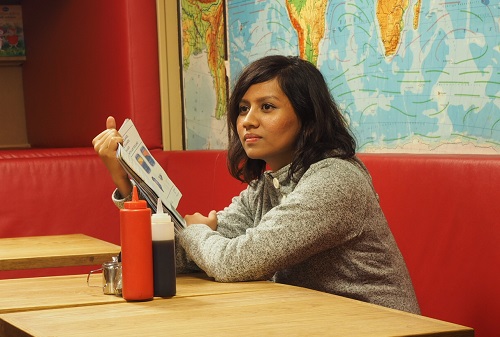
Nabilah Said. Photo: Erfendi Dhahlan.
What’s your favourite memory/story of your time at Centre 42?
Sabrina: I distinctly remember once having Bi(cara) going on upstairs in the Black Box, and then having to rush down to the Meeting Room right after to attend a rehearsal of my show Counting. That’s pretty up there – the fact that so much of my experience as an artist was with Centre 42 – along with the time you guys fed me on that one night I just came in to ask a semi-serious question about my fundraiser. Also, there was one time I literally wandered in to Centre 42 to take a nap between rehearsals on one of the benches outside, and Casey Lim was showing someone around, and they had to pass me while I was half-asleep and he said to the visitor: “And sometimes our artists sleep here as well.” Many a good times were had.
Nabilah: I think it was the sight of the long queues of people waiting to watch MTG’s reading showcase “ETA: 9 MIN” at Late-Night Texting in August 2017. That was quite overwhelming, because a year ago MTG was just an idea in my head that I wasn’t sure would quite work. I remembered thinking “wait, these people are in line to watch our show?” The setting of Late-Night Texting was already so magical – what with the fairy lights and general convivial vibe – and that visual of those queues just made my soul sing. I do apologise to everyone who had to wait in line though, I hope the experience was worth it!
Mun Wai: I think it was the performance night itself. The bump in was simple and I did everything with a team of just two people. It was the first time in a long time that I had such a simple set up. I was wondering if I actually had enough material to hold up the entire performance but in the end everything went rather well and the reception was rather warm. It was the first time I was subjecting my body to a much freer way of performing, using improvisational strategies instead of performing over rehearsed set choreography. Also, I was using my sensorial and thought impulses to trigger/stimulate action, movement, physical situations so that was quite scary too, because I had to be very in tune with my mind and body throughout the performance. At the end of the performance I felt like I finally found a way to work with improvisation. It was hard work but at the same time very liberating because it felt much more authentic and liberating.
Where will you be going and what will you be doing for your studies? And what are you looking forward to most about it?
Sabrina: I’ll be going to University of Essex, in Essex, U.K., pursuing BA Drama and Literature. I’m excited for some breathing space away from Singapore. To learn more about theatre and writing, and to have a bit more fun. I am also hoping to join the juggling, fire and magic club at my school – if the writing thing doesn’t work out, I’m running away to the circus (laughs)!
Nabilah: I’m taking a Master’s programme in Writing for Performance at Goldsmiths, University of London in the United Kingdom. There are a lot of writing programmes out there but I chose this one because it gives me opportunities to collaborate with artists from other fields, including music composers, visual artists and dramaturgs. This course is designed to train both playwrights and dramaturgs, so I’ll also have the opportunity to learn more about dramaturgy, which is a skill I hope to be better at in the future. In my one year away I also hope to be able to think of new ideas and plan future projects for when I am back in Singapore, on a personal level, as well as with MTG and other partners.
Mun Wai: I will be going to the Institute for Applied Theatre Studies at the Justus Liebig University in Giessen, Germany. I will be pursuing a Master’s in Choreography and Performance for two years. The programme will speak of choreography and performance in a much more expanded way. That is what I am most excited about. A lot of times in Singapore, choreography is dealt with in the narrow confines of formalistic dance – it is always about formal aesthetic concerns, how to design the body through virtuosic movement. In Singapore, we do not talk very much about how choreography can be a design of movement and time such that the design spurs/creates/affects/effects movement (whether bodily or not). Just like now Elangovan’s Talaq has shown, for example, how a tightly ‘choreographed’ patriarchal society, with all its rules and societal structures set by men, ends up in the marginalisation and disempowerment of women. I want to begin talking about choreography like that, not just how many turns I can do on stage or how high I can jump. That’s just athleticism and sport. It is also not about this naive idea of seeking social change through art, I have my reservations about that too. But at least, I am more interested in how my artistic tendencies and practices can weave into life much more.
When will we see you in Singapore again?
Sabrina: Gosh, that’s a toughie. I’ll be back every year (hopefully!) for summer breaks. But I’ll also be back to serve my NAC bond after four years, so there’s that. Hopefully I’ll have projects in between. That’ll be nice, wouldn’t it?
Nabilah: I’ll be back before the end of next year, raring to go out and get stuff done!
Mun Wai: I will still be visible don’t you worry (laughs). Two years will pass in a flash. Plus, coming to Germany is also about trying to stretch my network wider. It is not about forgoing Singapore.
By Gwen Pew
Published on 12 October 2017

